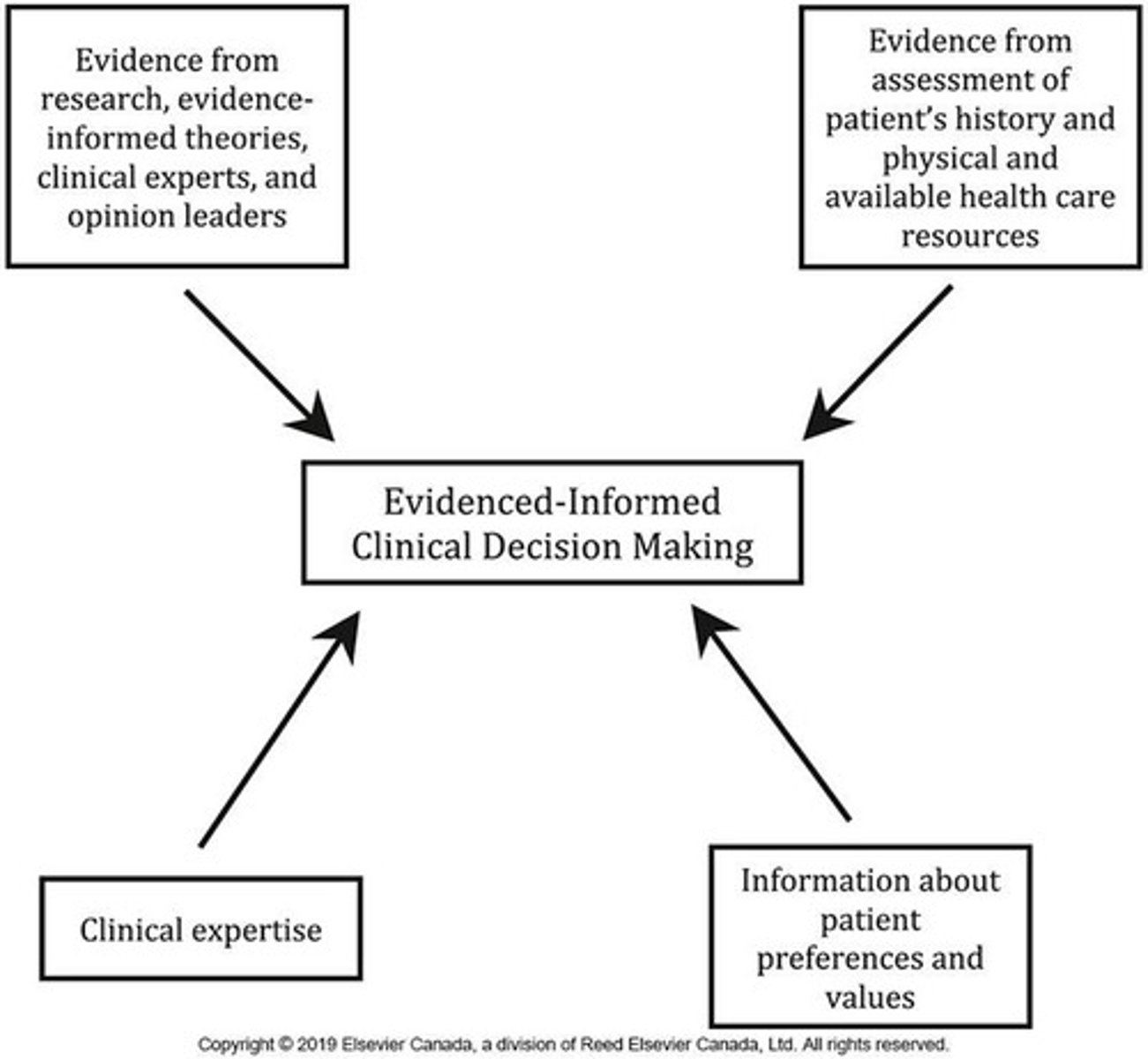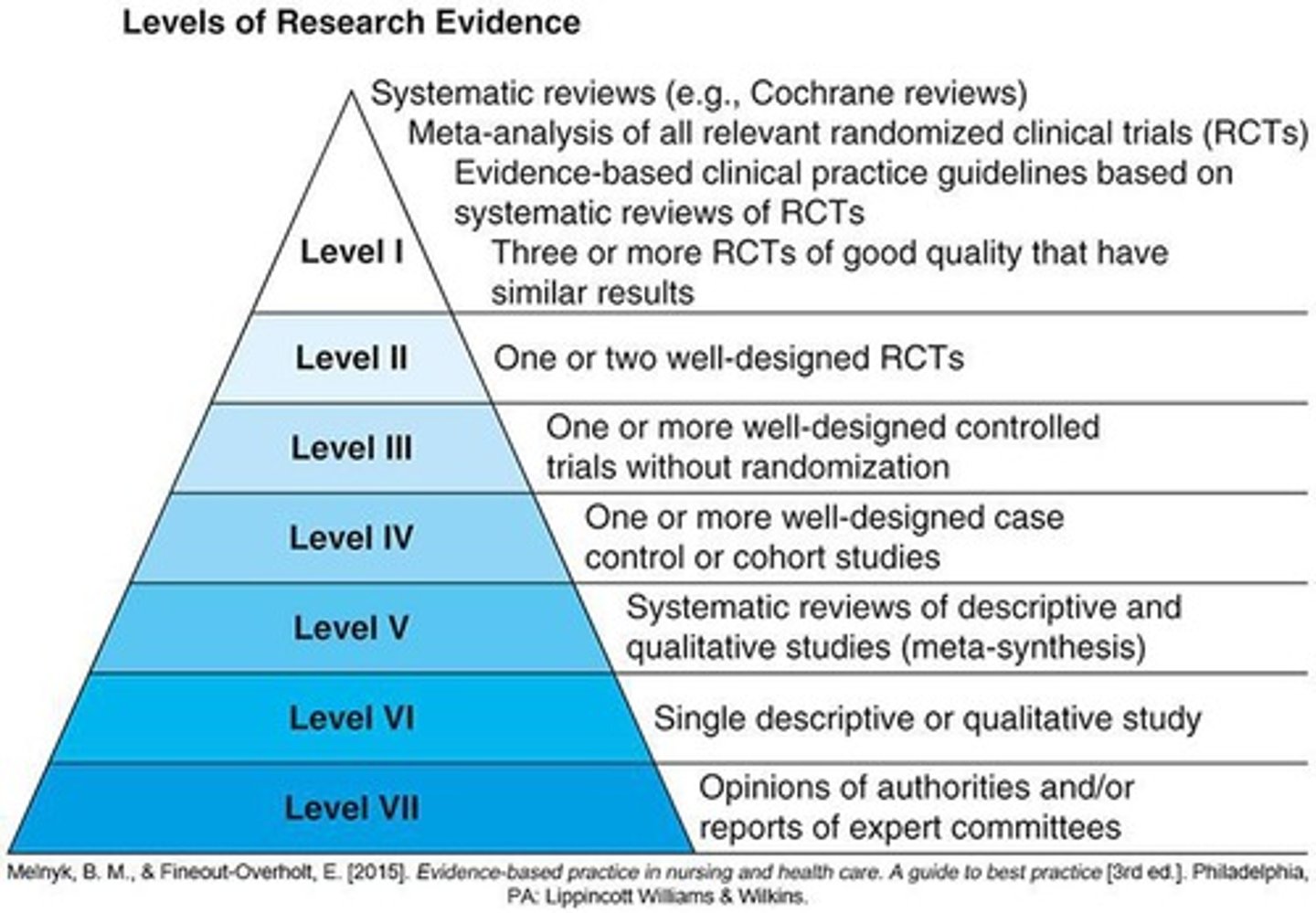Scholarship and Evidence-Based Practice in Nursing
1/87
There's no tags or description
Looks like no tags are added yet.
Name | Mastery | Learn | Test | Matching | Spaced |
|---|
No study sessions yet.
88 Terms
Scholarship
A full range of intellectual and creative activities that include the generation, validation, synthesis and/or application of knowledge to advance science, teaching, and nursing practice.
Importance of Scholarship
It is a process of generating new knowledge or validating existing knowledge, important as nursing is a young professional discipline.
Scholarship according to Boyer (1990)
Boyer proposed scholarship to include four elements: Scholarship of discovery, Scholarship of teaching, Scholarship of application, and Scholarship of integration.
Scholarship of Discovery
Creates new knowledge or validates existing knowledge, gained through research using quantitative and qualitative methods.
Criteria for Scholarship
For something to be considered scholarship, it must be published, peer-reviewed, and open for public dissemination.
Peer-reviewed
Open to critical review and evaluation by peers who do not have direct involvement with the research.
Scholarship Criteria Examples
Includes academic journals, abstracts, conferences, policy, pamphlets, patient information sheets, presentations, newsletters, and websites.
Registered Nurses as Scholars
Registered nurses demonstrate a lifelong commitment to excellence in practice through critical inquiry, continuous learning, application of evidence to practice, and support of research activities.
Levels of Evidence
A framework that categorizes the strength and reliability of research findings.
Critical Appraisal of Research Skills
The ability to evaluate research studies to determine their validity and applicability to practice.
Cultural Humility
Engaging in self-reflection to create culturally safe environments where clients perceive respect for their unique health care practices.
Nursing Informatics Competence
Engaging in activities to strengthen competence in nursing informatics.
Emerging Evidence and Technologies
Identifying and analyzing new evidence and technologies that may change, enhance, or support health care.
Community Health Issues
Using knowledge about current and emerging community and global health care issues and trends to optimize client health outcomes.
Lifelong Learning in Nursing
Engaging in practices that contribute to continuous professional development and learning.
Scholarship of Teaching
The study of teaching and knowledge, understanding how students learn and how teaching influences their learning process.
Scholarship of Application
Applying knowledge to real-world situations to improve practice and outcomes.
Scholarship of Integration
Connecting knowledge across disciplines to enhance understanding and application.
Research Activities Support
Supporting research activities and developing one's own research skills.
Best Evidence in Decision Making
Using the best available evidence to make informed decisions in nursing practice.
Translation of Knowledge
Translating knowledge from relevant sources into professional practice.
Self-reflection in Nursing
Engaging in self-reflection to improve practice and patient care.
Scholarship of Discovery Example
Learning from mothers, grandmothers, and great grandmothers about breastfeeding in the Northwest Territories.
Scholarship of Teaching
Occurs when a study has a research agenda that creates original educational materials or teaching models, which are then peer-reviewed, documented (published), shared for other nursing educators, and communicated to the public.
Scholarly Teaching
Involves updating course material, incorporating published research on course content and teaching strategies, developing new curricula to stimulate learners, reflecting on one's performance as a teacher, welcoming peer review of one's classroom teaching, mentoring and guiding students in their professional and academic development, and providing leadership in shaping teaching policy.
Scholarship of Application
Links scholarship to practice, must be documented, peer-reviewed, and disseminated to the public.
Example of Scholarship of Application
The Registered Nurses Association of the Northwest Territories and Nunavut (RNANT/NU) acknowledges the members of the Registered Nurse (RN) Practice Committee and the Nurse Practitioner (NP) Practice Committee.
Scholarship of Integration
Involves creating new knowledge by bringing pieces of knowledge together to form a new perspective, resulting in a better understanding of a topic.
Example of Scholarship of Integration
Publication of a textbook or chapter that synthesizes different professional perspectives.
Public Dissemination
The act of sharing a new program to improve the health and wellbeing of society.
Kerry Lynn Durnford and Heather Fikowski
Co-presented regarding compassion fatigue in Nursing and Social Work.
Carol Amirault
Co-created educational resources and conducted workshops for Medical Assistance in Dying in the NWT, integrating legislation into medical and nursing practice.
Pertice Moffitt and Greta Mehus
Wrote a paper regarding the history of the circumpolar nursing exchange relationship between Yellowknife and Northern Norway.
Distinction between Scholarly and Scholarship
Being Scholarly and scholarship are different concepts.
Instructor's Use of References
An example of scholarly activity where the instructor includes the most current and best available references in her learning activities and teaching.
Quality Scholarly Paper
A nursing student writes a quality scholarly paper on a topic that he has encountered in practice.
Co-authoring an Article
The student and instructor co-author and publish the article in the Journal of Nursing Education.
National Conference Attendance
A pediatric nurse attends a national conference on pediatric nursing.
Volunteer for RNANT/NU Committee
A nurse volunteers for a RNANT/NU committee.
Position Statement Development
The committee the nurse is on develops and publishes a position statement on the use of social media by registered nurses.
Evidence-Based Practice in Nursing
Independently, take approx. 20 minutes to read the article provided as part of required reading.
Wittenauer et al. (2015)
Reference for an article related to evidence-based practice in nursing.
Research-based nursing practice (RBNP)
A practice that integrates research findings into nursing care.
Evidence-based practice (EBP)
A decision-making process that integrates the best available evidence with clinical expertise and patient values.
Evidence-based decision-making (EBDM)
A systematic approach to making clinical decisions based on the best available evidence.
Evidence-informed practice (EIP)
A practice that utilizes evidence to inform clinical decisions while considering patient preferences.
Evidence-informed decision-making
The process of making clinical decisions based on the best available evidence and clinical judgment.
Evidence-informed decision-making (EIDM)
A key component of quality nursing practice that requires understanding evidence to support decisions.
Types of evidence
Includes research studies, literature reviews, textbooks, and non-research evidence such as quality improvement data.
5 Steps for Successful Evidence-Informed Decision-Making
1. Ask a question that clearly presents the clinical problem; 2. Identify and gather the most relevant evidence; 3. Critically appraise the evidence; 4. Integrate evidence with expertise and patient values; 5. Evaluate the outcome.

PICO
A framework for formulating clinical questions: P=Patient population, I=Intervention, C=Comparison, O=Outcome.
MEDLINE
The U.S. National Library of Medicine® database for biomedical literature.
CINAHL
Cumulative Index to Nursing and Allied Health Literature, containing over 25 million references to nursing and allied health journals.
Empirical Studies
Research that involves qualitative, quantitative, or mixed methods to gather data.
Literature reviews
Comprehensive surveys of existing literature on a specific topic.
Theory articles
Articles that discuss theoretical frameworks relevant to nursing practice.
Best research evidence
The highest quality evidence available from systematic research studies.
Clinical judgment
The ability to make informed decisions based on clinical evidence and patient needs.
Quality improvement data
Non-research evidence used to enhance healthcare practices and outcomes.
Patient values
Individual beliefs and preferences that influence patient care decisions.
Accountability in nursing
The responsibility of nurses to provide quality care and make informed decisions.
Cost-effective nursing care
Providing high-quality care while minimizing costs.
Clinical expertise
The skills and knowledge that a nurse acquires through experience and education.
Systematic reviews
A methodical and comprehensive synthesis of research studies on a particular topic.
Infection Control
Practices aimed at preventing the spread of infections in healthcare settings.
Clinical decisions
Choices made by healthcare professionals regarding patient care based on evidence and clinical judgment.
Quantitative Research
Phenomena that can be measured and qualified.
Qualitative Nursing Research
Poses questions about nursing phenomena that cannot be quantified and measured.
Dependent Variables
Variables that are measured in an experiment to see if they are affected by the independent variable.
Independent Variables
Variables that are manipulated in an experiment to observe their effect on dependent variables.
Hierarchy of Evidence for Quantitative Research
A structured framework that ranks the strength of research evidence.

CRAAP
A tool used for evaluating the quality of information based on Currency, Relevance, Authority, Accuracy, and Purpose.
Research Literacy
The ability to read, understand, and critically evaluate research articles.
Research Question
A clear, focused, and specific question that guides a research study.
Ethical Approval
Formal permission granted by an ethics committee to conduct a research study.
Strengths and Limitations
Factors that enhance or hinder the validity and reliability of a study.
Scholarship
The pursuit of knowledge through research, teaching, and application in a specific field.
Scholarship of Teaching
Research focused on improving teaching practices and educational outcomes.
Scholarship of Application
Research that applies theoretical knowledge to practical problems.
Scholarship of Discovery
Research aimed at generating new knowledge or insights.
Scholarship of Integration
Research that synthesizes existing knowledge across disciplines.
APA
The American Psychological Association style used for citing sources in academic writing.
Evidence-Based Nursing
Nursing practice that integrates the best available evidence with clinical expertise and patient values.
Research Article
A written report that presents the results of a research study.
Video Resource
A multimedia tool used to enhance understanding of how to read a research article.
Handout Activity
An exercise designed to reinforce learning by answering questions related to a research article.
Final Assignment
An in-class task that requires reading and responding to a research paper.
References
A list of sources cited in a research paper or article.